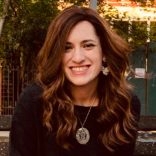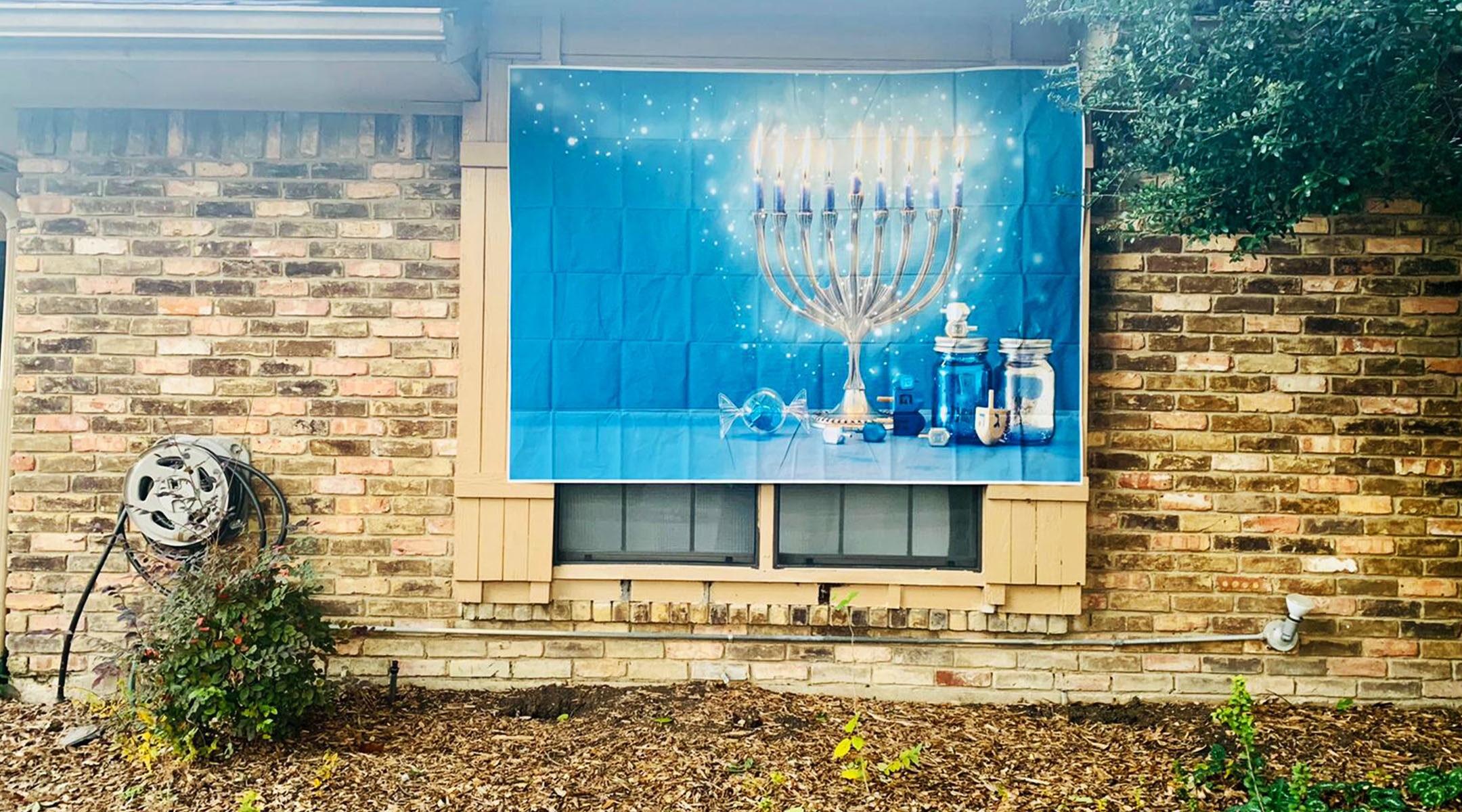(JTA) — When I go out with my kids, we often play a homemade game called, “I spy with my little eye something very Yiddish.” The kids pick up on anything related to the practices, laws and symbolism of Jewish tradition.
See two triangles that almost look like they could be a Star of David? You win a point! A mezuzah on someone’s door? Two points! It’s a great way for them to secure their sense of identity and see themselves in the things around them.
In prior years, during Hanukkah, the game has reached silly levels. Living in a Jewish community near a major city, there are just so many things to find that relate to our lives. Menorahs in windows after sunset, any random donut shop, even a bag of potatoes in the grocery store.
But this year, with the pandemic making this kind of urban exploration impossible or impractical, I realized something about the game. Playing it outside of our home means that my kids take the Jewish items inside of our home for granted. And when preparing for Hanukkah, this became especially clear.
Because the truth is, I’ve outsourced the Hanukkah experience more than any other holiday. And many of my fellow parents have done the same.
Parents of school-aged kids know this well. Unlike most major Jewish holidays, Hanukkah doesn’t require any school vacation days. And though one day of Purim can also be celebrated in school, Hanukkah is eight days long. And those days are some of the most enjoyable. Regular academic practices are replaced with school trips, fun activities and, of course, lots of junk.
Community events are early enough in the day, with menorah lighting happening at around 5:00pm, that even young kids can enjoy public affairs. The spiritual meaning of the holiday and its timing with Christmas make it incredibly visible as well. So it makes sense that many of us end up relying on others to make Hanukkah fun, meaningful and celebratory.
But this year, our home has become our community. We’ve had to learn how to adapt and bring what we could from our normal communal structures into our homes. We’ve learned a lot along the way about what is most meaningful to our family, about how we want our communal spaces to change in the future, and how we can keep holiday traditions alive even when we aren’t with our families and communities.
But I hadn’t quite figured out how to do that on Hanukkah. Our kids are in school but are restricted in how they can celebrate there. Communal activities are out of the question. We had previously travelled over Shabbat Hanukkah, which was no longer an option either.
And then it hit me.
We can do anything.
The beauty of this holiday — and especially of experiencing it amidst a global pandemic —is that we have the opportunity to make it our own. Eight full days to play as many games of dreidel, eat as many latkes and sing as many songs as we’d like. It’s an incredibly freeing feeling. Like the lights of the menorah, the possibilities can expand what we might have expected.
So, with this newfound knowledge, I turned to my go-to fun advisory board: my kids. They requested a parade, dessert for dinner, dreidel with Hanukkah gelt (instead of just chocolate chips), a game night, and something to put outside of our home to show the world what we’re celebrating.
We ordered some photo booth masks and put together a parade (which also turned into a play). We settled on whole wheat waffles with marshmallows for “dessert for dinner” night. We let them count out three chocolate coins each when they played dreidel. And we’ve ordered our “pin the candle on the menorah” for game night.
But my kids’ last request gave me pause. The idea of decorating the outside of our home was incredibly foreign to me. While I myself had grown up in an area with many brightly lit homes on the block, in my Orthodox Jewish upbringing I was often taught that the practice was exclusively for those celebrating Christmas, and that we should be proud of our own holiday and its traditions, which did not include decorating the outside of our home. My husband came from a similar background and understood my discomfort.
So, we made a compromise with the kids — we’ll put something up, but it won’t be lights. And it won’t be a Christmas decoration that’s Jew-ified. It will be something that suits us and our holiday. We settled on a large Hanukkah-themed backdrop to hang across the front of our house. We figured that not only could others admire it, but they could use it as a selfie background, if they so choose (#happyHanukkah).
We knew our home would be our community this year. What we hadn’t expected was that our practices might catch on or be noticed.
Immediately after we put the backdrop up, people started slowing down when driving by. If we were outside, drivers rolled down their windows to wish us Happy Holidays or a Happy Hanukkah. When they saw us walk to our home after a quick stroll around the neighborhood, several of our new neighbors who had noticed the image wished us the best. And then, two days after we put up our decorations, a Jewish family across the street put up a sign as well: “Eight nights, eight lights,” it read, the pride spreading like fire from our home to theirs.
I don’t know if we’ll celebrate like this in future years. Most of my list of Hanukkah activities is so candy-filled that they might not be ideal for a year when the kids get donuts in school, chocolate at a public menorah lighting and cake from bubbe over Shabbat.
But I am certain that I’ve experienced a paradigm shift — a different perspective that I couldn’t reach during any other holiday we’ve experienced during the COVID-19 pandemic. While preparing for and managing the other holidays, I had intuitively understood that many things inside of our home would not change. That those things that would be done differently revolved around the ways that we engage with others —services, having guests, visiting family. But when it comes to Hanukkah, we realized we didn’t have much inside our home. The small activities we engaged in were dwarfed by the communal and institutional ones.
We now see it as our home’s duty to directly engage with the holiday, in a way we never have. And I know that’s something we’ll try to hold on to for a very long time.
JTA has documented Jewish history in real-time for over a century. Keep our journalism strong by joining us in supporting independent, award-winning reporting.







